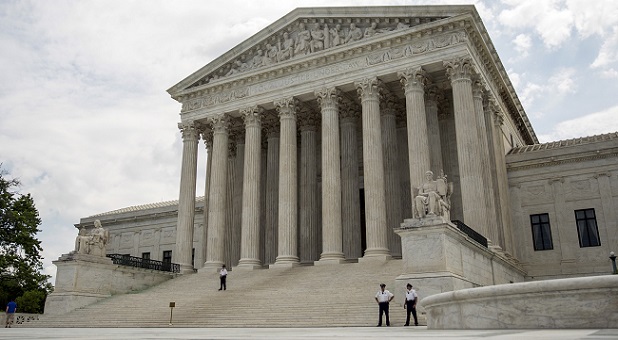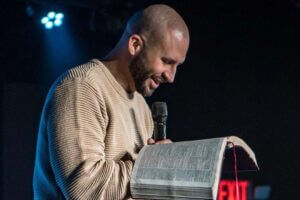This week, along with The Gibbs Law Firm and Alliance Defending Freedom, Liberty Institute and its high-profile volunteer attorney—Allyson Ho, the only female lawyer who has argued two cases in the last Supreme Court of the United States’ term—filed a brief at the U.S. Court of Appeals for the Fourth Circuit in the case of Lund v. Rowan County, defending the right of the Rowan County, North Carolina commissioners to open their meetings in prayer after the prayer was challenged by The American Civil Liberties Union (ACLU). “PART OF OUR HERITAGE AND TRADITION” For many years, the Rowan County Commissioners opened their meetings with legislation prayer—an activity, as described by Supreme Court Justice Kennedy in his opinion in Galloway v. Town of Greece, that “has become part of our heritage and tradition, part of our expressive idiom, similar to the Pledge of Allegiance, inaugural prayer, or the recitation of ‘God save the United States and this honorable Court’ at the opening of this Court’s sessions.” Rowan County allowed each commissioner, on a rotating basis, an opportunity to offer an invocation or lead a moment of silence at the beginning of each commissioners’ session—which also includes a call to order and the Pledge of Allegiance. Each commissioner decided whether to open with a moment of silence or a prayer (of which the content was also his or her decision). No one was required to participate in the invocation. They could remain seated, leave the room, or arrive after invocation. But in March 2013 on behalf of three Rowan County residents, the ACLU objected to the invocations. After a two-year legal battle, a federal court ruled that the Rowan County Board of Commissioners violated the Constitution with their prayer practice before meetings. Liberty Institute and its allied attorneys are now appealing this ruling. “We are honored that someone of Allyson Ho’s reputation and accomplishment is leading this appeal for our client,” says Hiram Sasser, Liberty Institute Deputy Chief Counsel. “Her extensive experience before the United States Supreme Court is impressive and extremely helpful on this issues.” Ms. Ho is nationally recognized as a “superstar appellate lawyer” as noted in Chambers and Partners. After earning a Ph.D. from Rice University and a J.D. from University of Chicago Law School, Ms. Ho clerked for Supreme Court Justice Sandra Day O’Connor and currently serves on the bipartisan Federal Judicial Evaluation Committee. Most recently, Ms. Ho served as lead counsel in Liberty Institute’s successful defense of the Mt. Soledad Veterans Memorial in San Diego, California. LEGISLATIVE PRAYERS DO NOT OFFEND THE ESTABLISHMENT CLAUSE In its 52-page brief, Liberty Institute asserts that the legislative prayers offered by the county commissioners do not offend the Establishment Clause of the First Amendment under Chambers v. Marsh and Galloway v. Town of Greece—but resolve this case and require a reversal.
- Chambers v. Marsh—In 1983, the U.S. Supreme Court held that the Nebraska Legislature’s practice of opening its sessions with prayer by a chaplain paid by the State did not violate the Establishment Clause.
- Galloway v. Town of Greece—In 1984, the United States Supreme Court ruled that governmental bodies may open their meetings in prayer—delivered by local, volunteer clergy—without violating the Establishment Clause, including prayers with specific religious references.
Liberty Institute applies the rulings of these two cases further in three key points of its argument:
- Opening legislative meetings with prayer does not violate the Establishment Clause.
The plaintiffs challenged the contents of the prayers that opened and solemnized the Rowan County Commission’s meetings. But the Supreme Court, in Galloway v. Greece, held that opening town meetings with faith-specific prayers does not violate the Establishment Clause. Once the Supreme Court decided Greece, this should have been an easy case to resolve in Rowan County’s favor. The district court reversibly erred in concluding that Rowan County’s legislative prayer practice falls outside of Greece and Marsh merely because legislators deliver the prayers. As the Supreme Court explained in Greece, it is perfectly permissible for legislative prayer to “reflect the values [legislators] hold as private citizens,” and “an opportunity for them to show who and what they are.”
- The county’s legislative prayers do not fall outside of Marsh and Greece and cannot be viewed as “coercive.” In Greece, the Supreme Court clarified that legislative prayers are constitutional so long as they do not “over time” show that the invocations “denigrate nonbelievers or religious minorities, threaten damnation, or preach conversion” … The district court did not identify a single prayer—let alone a pattern of prayers over time—that denigrate[d] nonbelievers or religious minorities, threaten[ed] damnation, or preach[ed] conversion.” … Plaintiffs were simply asked to stand for the opening ceremony—including the invocation and the Pledge of Allegiance—and, as Justice Kennedy anticipated in Greece, and the record establishes here, plaintiffs were not required to participate in the invocation.
- Marsh and Greece affirm a tradition of legislative prayer.
The Supreme Court’s ruling in Greece quotes Marsh and asserts that “‘in light of the unambiguous and unbroken history of more than 200 years,there can be no doubt that the practice of opening legislative sessions with a prayer has become part of the fabric of our society.'” The Rowan County commissioners’ opening prayers are part of the tradition of legislative prayer affirmed in Marsh and Greece, and the district court’s contrary judgment should be reversed. Any other result requires the banning of prayer proclamations by all elected officials, including mayors, governors and the President of the United States. FIGHTING BACK AGAINST INCREASING ANTI-FAITH EFFORTS The law is on the side of religious freedom, and that’s why Liberty Institute wants to help Rowan County commissioners and other localities fight back and win the battle to protect public religious expressions of faith—including, among others:
- Public prayer before government meetings
- Plaques and memorials
- The display of Ten Commandments and Nativity scenes or menorahs on public and private property
- The expression of “Under God” in the Pledge of Allegiance
- The use of “In God We Trust” in government buildings and documents
- State laws that protect religious liberty
For more information about Liberty Institute’s legal services or to request legal help, visit www.libertyinstitute.org/take-action/request-legal or call (972) 941-4444.
See an error in this article?
To contact us or to submit an article




















